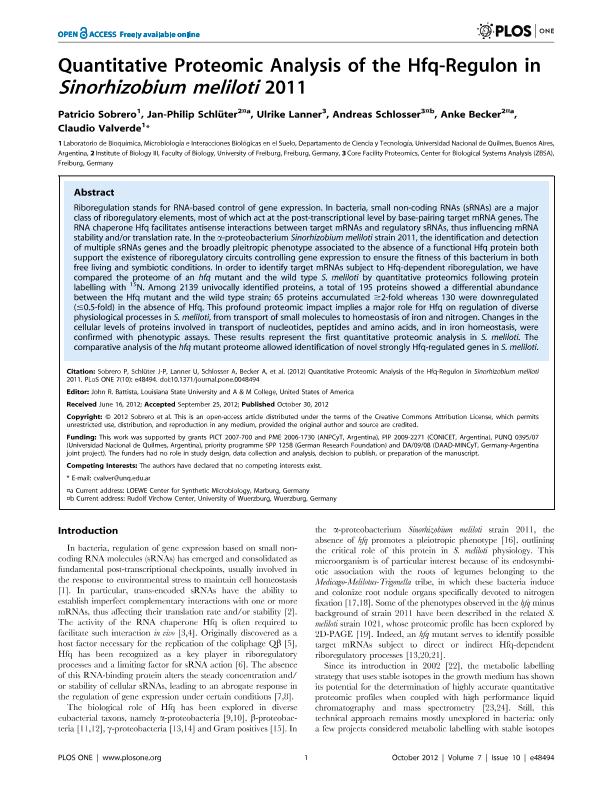Mostrar el registro sencillo del ítem
dc.contributor.author
Sobrero, Patricio Martín

dc.contributor.author
Schluter, Jan Phillip
dc.contributor.author
Lanner, Ulrike
dc.contributor.author
Schlosser, Andreas
dc.contributor.author
Becker, Anke
dc.contributor.author
Valverde, Claudio Fabián

dc.date.available
2023-05-15T12:05:12Z
dc.date.issued
2012-10
dc.identifier.citation
Sobrero, Patricio Martín; Schluter, Jan Phillip; Lanner, Ulrike; Schlosser, Andreas; Becker, Anke; et al.; Quantitative Proteomic Analysis of the Hfq-Regulon in Sinorhizobium meliloti 2011; Public Library of Science; Plos One; 7; 10; 10-2012; 1-11
dc.identifier.issn
1932-6203
dc.identifier.uri
http://hdl.handle.net/11336/197447
dc.description.abstract
Riboregulation stands for RNA-based control of gene expression. In bacteria, small non-coding RNAs (sRNAs) are a major class of riboregulatory elements, most of which act at the post-transcriptional level by base-pairing target mRNA genes. The RNA chaperone Hfq facilitates antisense interactions between target mRNAs and regulatory sRNAs, thus influencing mRNA stability and/or translation rate. In the α-proteobacterium Sinorhizobium meliloti strain 2011, the identification and detection of multiple sRNAs genes and the broadly pleitropic phenotype associated to the absence of a functional Hfq protein both support the existence of riboregulatory circuits controlling gene expression to ensure the fitness of this bacterium in both free living and symbiotic conditions. In order to identify target mRNAs subject to Hfq-dependent riboregulation, we have compared the proteome of an hfq mutant and the wild type S. meliloti by quantitative proteomics following protein labelling with 15N. Among 2139 univocally identified proteins, a total of 195 proteins showed a differential abundance between the Hfq mutant and the wild type strain; 65 proteins accumulated ≥2-fold whereas 130 were downregulated (≤0.5-fold) in the absence of Hfq. This profound proteomic impact implies a major role for Hfq on regulation of diverse physiological processes in S. meliloti, from transport of small molecules to homeostasis of iron and nitrogen. Changes in the cellular levels of proteins involved in transport of nucleotides, peptides and amino acids, and in iron homeostasis, were confirmed with phenotypic assays. These results represent the first quantitative proteomic analysis in S. meliloti. The comparative analysis of the hfq mutant proteome allowed identification of novel strongly Hfq-regulated genes in S. meliloti.
dc.format
application/pdf
dc.language.iso
eng
dc.publisher
Public Library of Science

dc.rights
info:eu-repo/semantics/openAccess
dc.rights.uri
https://creativecommons.org/licenses/by-nc-sa/2.5/ar/
dc.subject
Hfq
dc.subject
Riboregulation
dc.subject
Sinorhizobium meliloti
dc.subject
Quantitative proteomics
dc.subject.classification
Biología Celular, Microbiología

dc.subject.classification
Ciencias Biológicas

dc.subject.classification
CIENCIAS NATURALES Y EXACTAS

dc.title
Quantitative Proteomic Analysis of the Hfq-Regulon in Sinorhizobium meliloti 2011
dc.type
info:eu-repo/semantics/article
dc.type
info:ar-repo/semantics/artículo
dc.type
info:eu-repo/semantics/publishedVersion
dc.date.updated
2023-05-12T14:48:34Z
dc.journal.volume
7
dc.journal.number
10
dc.journal.pagination
1-11
dc.journal.pais
Estados Unidos

dc.journal.ciudad
San Francisco
dc.description.fil
Fil: Sobrero, Patricio Martín. Universidad Nacional de Quilmes. Departamento de Ciencia y Tecnología; Argentina. Consejo Nacional de Investigaciones Científicas y Técnicas; Argentina
dc.description.fil
Fil: Schluter, Jan Phillip. Albert Ludwigs University of Freiburg; Alemania
dc.description.fil
Fil: Lanner, Ulrike. No especifíca;
dc.description.fil
Fil: Schlosser, Andreas. No especifíca;
dc.description.fil
Fil: Becker, Anke. Albert Ludwigs University of Freiburg; Alemania
dc.description.fil
Fil: Valverde, Claudio Fabián. Consejo Nacional de Investigaciones Científicas y Técnicas; Argentina. Universidad Nacional de Quilmes. Departamento de Ciencia y Tecnología; Argentina
dc.journal.title
Plos One

dc.relation.alternativeid
info:eu-repo/semantics/altIdentifier/url/http://dx.plos.org/10.1371/journal.pone.0048494
dc.relation.alternativeid
info:eu-repo/semantics/altIdentifier/doi/http://dx.doi.org/10.1371/journal.pone.0048494
Archivos asociados
